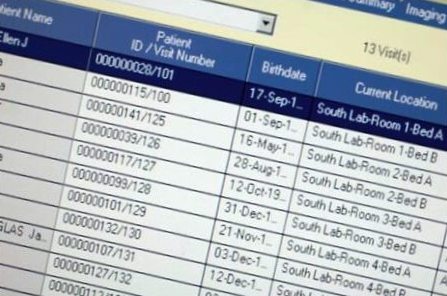Informatics specialists streamline healthcare
By Jennifer Walker
 There’s no doubt that clinical information systems are improving healthcare. But to be effective, each system that stores patient health records, provider orders, and clinical documentation must meet the unique needs of its healthcare unit, and each staff member must be trained in how to use it.
There’s no doubt that clinical information systems are improving healthcare. But to be effective, each system that stores patient health records, provider orders, and clinical documentation must meet the unique needs of its healthcare unit, and each staff member must be trained in how to use it.
At The Johns Hopkins Hospital, a new team of five nursing informatics specialists are doing just that.
As clinicians and experts in information technology, these nurses are liaisons in a multidisciplinary effort to design and implement systems that streamline patient care.
“They’re bridgers,” explains Stephanie Poe, DNP, MSN ’92, RN ’78, Director of Nursing, Clinical Quality; Chief Nursing Information Officer; and executive leader of the team. “They bridge the needs of the clinical community with respect to patient care needs, the actual functionality of current technology, and the workflow requirements of the people who use this technology.”
So far, systems have been activated for psychiatry, neuroscience, and medicine, making patients’ health information easily accessible for everyone on the clinical care team.
“This ease of access and consistency will afford us an opportunity not previously seen in a complex medical center,” says Stephanie Reel, Vice Provost for Information Technology and Chief Information Officer at Hopkins.
Still, the systems can’t improve healthcare if providers don’t know how to use them. The team helps here too: they recruit hundreds of nurses, physicians, and other healthcare professionals who know the systems and can support other clinicians in building their information technology skills.
Poe also partners with Chief Medical Information Officer Peter Greene, MD, who provides informatics systems leadership to the medical staff. Together, they ensure these systems are designed to meet the needs of both nurses and physicians. Greene says that these systems are closing the gap between nursing and physician documentation. “Getting the data all in one place where all members of the care team can see and share that data makes the care team more patient-centered and that improves healthcare.”
In the next year, the team will work with department-based nursing informatics specialists to implement systems for surgery and pediatrics, but their job doesn’t end there. “These systems are not static,” says Poe. The team will be refining them—and continually improving patient care—well into the future.
 No. 1 Rankings for the School of Nursing and a Pipeline to the “Best Jobs”
No. 1 Rankings for the School of Nursing and a Pipeline to the “Best Jobs” Best of On The Pulse 2023
Best of On The Pulse 2023 Dr. Bonnielin Swenor, Inaugural Endowed Professor of Disability Health and Justice
Dr. Bonnielin Swenor, Inaugural Endowed Professor of Disability Health and Justice Celebrate National Hispanic Heritage Month
Celebrate National Hispanic Heritage Month Nurses Educational Funds (NEF) Awards Scholarships to Six JHU School of Nursing Doctoral Students
Nurses Educational Funds (NEF) Awards Scholarships to Six JHU School of Nursing Doctoral Students






